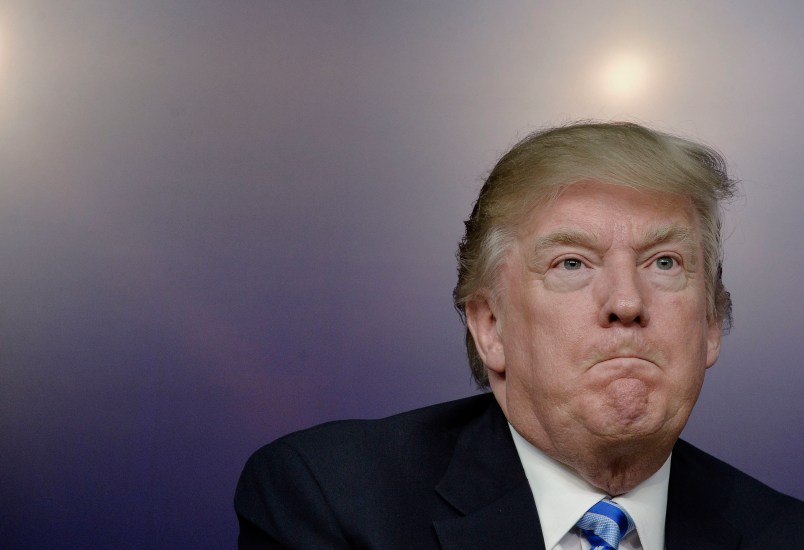A letter signed by both health care industry groups and business community organizations called for President Trump to continue the Obamacare subsidies to insurers known as cost sharing reduction payments, which the administration has been playing coy about preserving in the face of a lawsuit brought against them by the House GOP.
“The most critical action to help stabilize the individual market for 2017 and 2018 is to remove uncertainty about continued funding for cost sharing reductions,” the letter to Trump said. It was signed by America’s Health Insurance Plans, the American Academy of Family Physicians, the American Benefits Council, the American Hospital Association, the American Medical Association, the Blue Cross Blue Shield Association, the Federation of American Hospitals, and the U.S. Chamber of Commerce.
House Republicans targeted the subsidies under President Obama with a legal challenge in 2014, claiming they were illegal because Congress did not explicitly appropriate the payments. A federal judge sided with the Republicans in May but paused the ruling so that the administration could appeal the decision.
A sudden end to the payments would result in major disruption to the individual marketplace, as insurers would likely hike up premiums to make up the short fall or leave exchanges—maybe immediately.
Now that the Trump administration has taken over, the fate of the subsides—which keep out-of-pocket costs down for low income consumers, as mandated by the Affordable Care Act—is unclear, as Trump could stop them voluntarily or through withdrawing the legal appeal.
House Republicans and the Trump administration were able to secure a pause in the legal proceedings until May, when they’ll have to tell the court their next moves in the case.
GOP congressional leaders and the Trump administration have signaled they intend to keep the payments going at least through that point of the litigation. But Trump’s Department Health and Human Services added to the uncertainty in a confusing statement responding to a New York Times report highlighting the White House’s decision to keep the subsidies funded in the short term that said that the “administration is currently deciding its position on this matter.”
Wednesday’s letter from the industry groups warned of the premium hikes and insurers exits that would occur, as well as the impact on health care providers who will bear the brunt of uncompensated care.
“We urge the Administration and Congress to take quick action to ensure CSRs are funded,” the letter said.
Read the full letter below:
Dear Mr. President:
As providers of healthcare and coverage to hundreds of millions of Americans, we share many core principles and common priorities. We believe that every American deserves affordable coverage and high-quality care. We stand ready to work with the Administration and all members of Congress to keep this commitment.A critical priority is to stabilize the individual health insurance market. The window is quickly closing to properly price individual insurance products for 2018.
The most critical action to help stabilize the individual market for 2017 and 2018 is to remove uncertainty about continued funding for cost sharing reductions (CSRs). Nearly 60 percent of all individuals who purchase coverage via the marketplace – 7 million people – receive assistance to reduce deductibles, co-payments, and/or out-of-pocket limits through CSR payments. This funding helps those who need it the most access quality care: low- and modest-income consumers earning less than 250 percent of the federal poverty level. If CSRs are not funded, Americans will be dramatically impacted:
• Choices for consumers will be more limited. If reliable funding for CSRs is not provided, it may impact plan participation, which would leave individuals without coverage options.
• Premiums for 2018 and beyond will be higher. Analysts estimate that loss of CSR funding alone would increase premiums for all consumers – both on and off the exchange – by at least 15 percent. Higher premium rates could drive out of the market those middle-income individuals who are not eligible for tax credits.
• If more people are uninsured, providers will experience more uncompensated care which will further strain their ability to meet the needs of their communities and will raise costs for everyone, including employers who sponsor group health plans for their employees.
• Hardworking taxpayers will pay more, as premiums grow and tax credits for low-income families increase, than if CSRs are funded.
We urge the Administration and Congress to take quick action to ensure CSRs are funded. We are committed to working with you to deliver the short-term stability we all want and the affordable coverage and high-quality care that every American deserves. But time is short and action is needed. By working together, we can create effective, market-based solutions that best serve the American people.







One page with bullet points - they certainly kew their audience. Unfortunately they forgot to lick his taint about what a great man he is at least 3 times in the early narrative.
I wonder what he has a mouth full of.
Looks like he wants to spit it out but can’t until the cameras are gone. lol
What an evil, spiteful human being. I used to see people like this in movies when I was a kid, and never believed they could be real.
The ONLY response I want to hear from Dems: WE FUCKING DARE YOU.
I think he’s so desperate that he would consider any response at all to be a victory. Tomorrow he’ll probably “clarify”. The payment withhold is illegal anyway. Welcome to more Federal Judge smackdown.